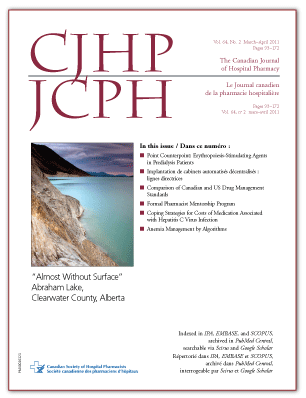Developing, Implementing, and Evaluating a Formal Pharmacist Mentorship Program
DOI:
https://doi.org/10.4212/cjhp.v64i2.996Keywords:
mentoring, professional development, job satisfaction, professional relationship, mentorat, perfectionnement professionnel, satisfaction au travail, relation professionnelleAbstract
ABSTRACT
Background: Mentoring is associated with positive professional and personal outcomes. However, there are few published data on mentoring programs for pharmacists.
Objective: To develop and evaluate a mentorship program for hospital pharmacists that was implemented at St Joseph's Healthcare Hamilton, in Hamilton, Ontario, by identifying the benefits and challenges that participants experienced and determining whether the program provided the necessary skills for a successful mentoring relationship.
Methods: A descriptive pilot study was performed between June 2007 and November 2008. Focus groups and self-administered questionnaires were conducted at two time points (after 3-4 months and at the end of the study period). The focus groups were conducted separately for mentors and mentees. Data were summarized by predefined categories. Quantitative data from the questionnaires were summarized as medians, minimums, and maximums, and qualitative survey data were transcribed and reviewed.
Results: Three mentors were each paired with a mentee. The mentees identified an average of 4 learning objectives. All of the mentees reported improvements in their self-perceived level of competency and skill within the mentoring relationship and their confidence in their ability to perform the functions of a hospital pharmacist. The job satisfaction of both mentors and mentees improved. Reported challenges were related to scheduling and documentation. Mentors and mentees reported high levels of overall satisfaction with the program, at both of the evaluation time points. Participants spent less than 60 min/week each on mentoring activities.
Conclusions: Both mentors and mentees benefited from the mentoring relationship.
RÉSUMÉ
Contexte : Le mentorat est associé à des résultats positifs sur le plan professionnel et personnel. Il existe toutefois peu de données sur des programmes de mentorat pour les pharmaciens.
Objectif : Concevoir et évaluer un programme de mentorat pour les pharmaciens d'hôpitaux mis sur pied au St Joseph's Healthcare Hamilton, à Hamilton, en Ontario, en déterminant les avantages et les problèmes connus des participants et si le programme a conféré les compétences nécessaires à une relation de mentorat fonctionnelle.
Méthodes : Une étude pilote descriptive a été menée entre juin 2007 et novembre 2008. Des groupes de discussion et des questionnaires autoadministrés ont été réalisés à deux moments (après 3-4 mois et à la fin de l'étude). Les groupes de discussion étaient distincts pour les mentors et pour les mentorés. Les données ont été résumées selon des catégories prédéfinies. Les données quantitatives issues des questionnaires ont été résumées selon des médianes, des minimums et des maximums, et les données qualitatives dégagées des enquêtes ont été transcrites et analysées.
Résultats : Trois mentors ont été chacun appariés avec un mentoré. Les mentorés ont défini en moyenne quatre objectifs d'apprentissage. Tous les mentorés ont signalé des améliorations quant à leur perception de leur niveau de compétence et d'habileté dans le cadre de leur relation de mentorat et quant à leur confiance dans leur capacité à exécuter les tâches d'un pharmacien d'hôpital. Les mentors et les mentorés étaient également plus satisfaits de leur travail. Les problèmes signalés étaient liés aux horaires et à la documentation. Les mentors et les mentorés ont déclaré dans l'ensemble être très satisfaits du programme, aux deux moments d'évaluation. Chaque participant consacrait moins de 60 minutes par semaine à des activités de mentorat.
Conclusions : Les mentors autant que les mentorés ont bénéficié de la relation de mentorat.
Downloads
Downloads
Issue
Section
License
Copyright © Canadian Society of Healthcare-Systems Pharmacy.
After publication of a manuscript in the CJHP, the authors of the manuscript must obtain written permission from the CSHP (publications@cshp.ca) before reproducing any text, figures, tables, or illustrations from the work in future works of their own. If a submitted manuscript is declined for publication in the CJHP, all said rights shall revert to the authors. Please note that any forms (e.g., preprinted orders and patient intake forms) used by a specific hospital or other health care facility and included as illustrative material with a manuscript are exempt from this copyright transfer. The CJHP will require a letter from the hospital or health care facility granting permission to publish the document(s).










